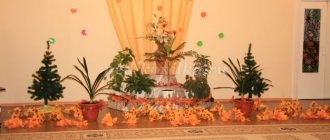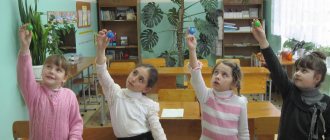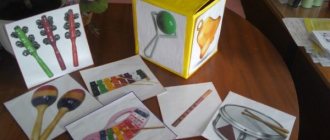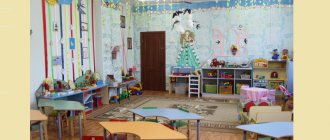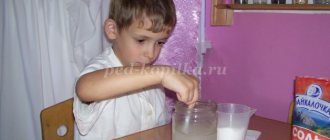Non-traditional forms of holding literary festivals in kindergarten
Bibliographic description:
Ivanova, N. M. Non-traditional forms of holding literary holidays in kindergarten / N. M. Ivanova, A. I. Voronina. — Text: immediate // Education: past, present and future: materials of the I International. scientific conf. (Krasnodar, August 2020). — Krasnodar: Novation, 2020. — pp. 30-32. — URL: https://moluch.ru/conf/ped/archive/205/10893/ (access date: 10.10.2020).
Today, all over the world there is a decline in interest in reading. In the domestic National Program for the Support and Development of Reading (2007–2020) about; and further “...the main task is to arouse interest in reading among the younger generation..., to ensure the growth of the prestige of reading as a cultural value...” [6, p. 1].
It is known that reading experience begins in childhood, so it is important to develop an interest in listening and reading literary works, starting from an early age. One of the means to stimulate interest in fiction is a literary festival. But, as practice shows, such holidays in preschool educational organizations today are rarely held and mainly in traditional forms, such as literary matinees; leisure evenings dedicated to the work of a writer or poet; evenings of fairy tales. Literary quizzes and literary concerts are held less often, and literary lounges are held very rarely. At the same time, modern approaches to preschool education require, among other things, the use of innovative non-traditional forms of organizing interaction between adults and children in the educational process, including in terms of holding literary festivals. Non-traditional forms of joint activities ensure high creative activity, first of all, of the pupils themselves, which is an important stimulating factor in the development of children's creative potential and the formation of the child's personality as a whole. Non-traditional forms of literary holidays, being remembered for a long time by their unusual holding, contribute to the fact that children try to read or listen to new literary works, in order to then again take an active part in such events. Such holidays make reading (listening) to fiction a vital need for children, creating a positive emotional atmosphere of communication with a book together with people close to them: teachers, peers, parents and other family members.
Analysis of scientific and methodological literature on the problem and our own practical experience indicate that kindergarten teachers practically do not develop non-traditional forms of holding literary festivals, therefore, from our point of view, it is advisable to turn to the experience of children's libraries, which today have developed many different innovative forms of attracting children and adolescents to reading. We have analyzed the similar experience of some children's libraries and presented the characteristics of non-traditional forms of attracting children to reading, which, in our opinion, can be used by kindergarten teachers as a form of holding literary festivals.
Literary lotto can become part of literary leisure or a great literary festival. In general, lotto is a game of chance using special cards with a series of numbers printed on them. When conducting literary lotto with children of senior preschool age, cards are used on which numbers (from 1 to 9) are depicted in the cells of the playing field, indicating the numbers of literary questions. The cut cards show the answers to the questions. These can be heroes of literary works, plot pictures based on the content of the work, an image of the scene, etc. The presenter names the question number, voices the question, the children choose an “answer” from the cut-out pictures and close the cell with the question number on the playing field. The winner is the participant (or team of participants) who is the first to cover all the cells of the playing field. The playing field and cut cards, if multimedia is available, can be transferred to the interactive board; in this case, teams will take turns filling out cards with playing fields by dragging the pictures with the mouse.
A literary fair is one of the non-traditional forms of organizing a literary festival, which includes a complex of small, diverse literary events taking place simultaneously. Literary quizzes and competitions may be held during the fair; meetings with interesting people (poets, storytellers, journalists); amateur performances (poetry readings, dramatizations of excerpts from fairy tales, puppet shows, interactive performances), entertainment programs with the participation of animators, prize drawings, etc. A feature of the literary fair is the absence of a single expressed theme, since the events taking place at the fair are quite diverse ; At the same time, literary content of the content of each event is mandatory. A literary fair requires quite a lot of children's literary experience and is complex in terms of preparation and implementation, therefore, from our point of view, this form of literary festival is advisable to use in working with children in the preparatory group for school.
An interesting non-traditional form of holding a literary holiday is a literary travel game, which is a playful event on a literary theme. When preparing a literary game - a journey, it is necessary to stylize the road or the journey as a whole with the obligatory stops - stations, houses, roads, paths, forest edges, islands, etc. Such stylization must correspond to the theme of the journey. If multimedia is available, stylization is carried out using slide presentations or by plotting a route on an interactive whiteboard. The themes of literary travel games are quite diverse: it can be a virtual trip to the house-museum of a writer (A. N. Ostrovsky, the Shchelykovo estate in the Kostroma region, the fairy tale “The Snow Maiden”); to the places of ongoing action described in literary works (Ural Mountains, tales of P. Bazhov), to the writer’s homeland (fairy tales of H. H. Andersen, Denmark), an ecological game-journey through stories about nature, sea stories, etc.; travel with the heroes of literary works, etc.
With children of senior preschool age, you can hold a literary auction - a kind of literary game, where the rules of real auctions are copied: the one whose correct answer to the proposed question is the last and most complete wins. “Experts” of literary works (children and adults: teachers and family members of pupils) enter the “bidding”. The most well-read people get the opportunity to “buy” a book. To conduct the game, it is necessary to prepare books for “sale,” as well as questions and tasks that auction participants will be asked to answer. The auction can be thematic and universal, when tasks are devoted to books of different content. “Items” of literary heroes made by the hands of auction participants can also be put up for auction. It is advisable to include a variety of educational games in the auction program.
A literary auction can be held in another form. Each group of participants presents the contents of one previously read book so that those present have a desire to read it. The group with the most votes from participants wins. At the end of the auction, the book must be read in the kindergarten group(s). The group participating in the “auction” may include the student’s family (or several families) if the holiday is held in a group. If a holiday is planned for all groups of senior preschool age, the age group of students, their parents and teachers become participants in the literary auction. Books that should be read in a family or group are discussed in advance. It is advisable to make such an auction thematic and play fairy tales of one author, tales about animals (plants, sea creatures, human labor, seasons, etc.), tales about gnomes and little people, funny stories about children, stories about animals, funny adventures, modern books by one children's author, etc.
One of the interesting non-traditional forms of organizing a literary holiday is a flashbook, during which an introduction to interesting children's books takes place. Such acquaintance is organized using passages, quotes, illustrations, constructive pictures, presentations, dramatization with the help of toys, personal experiences and other information about the book.
Literary information digest involves the preparation of short, vivid messages on literary topics. A small group of children and adults prepares information about one literary event that interests them. This may be an interesting fact from the life of writers, their work, writing a book; an event concerning the world of literature; brief age-appropriate summary of the most popular children's books, etc.
The literary kaleidoscope includes demonstrations of fragments of interesting events on a literary theme, scenes from children's books, and theatrical fragments. This form of holding a literary festival is distinguished by a rapid change of faces and events associated with the characters of the books. The final literary lesson or literary leisure evening in the form of a literary kaleidoscope is recommended to be carried out by V. V. Gerbova. In early preschool age, a literary kaleidoscope is held, according to the author, with the goal of pleasing children by reading them their favorite literary works and helping them remember some of them. During the literary kaleidoscope, children guess which literary works they know are excerpts from; looking for answers to problematic questions; participate in mini-dramatizations, act out scenes based on the content of the work; play, put together puzzles, draw, listen to music, etc. In older preschool age, the author recommends including quizzes in the literary kaleidoscope; dramatizations of small excerpts from 1-2 works prepared in advance by children from other groups or younger schoolchildren; performances of singing heroes of works; adults reading excerpts from children’s favorite works; competition for the best performer of the role of a gnome, brownie, etc. [1, p. 47–48].
Today, a non-traditional form of organizing a literary holiday - stories - is becoming increasingly popular. "Storysec" translated from English means "bag of stories." This is a real canvas bag, inside which is a good artistic illustrated children's book with additional materials used to introduce the contents of the book. Additional materials include soft toys, props, a popular science book on the topic, an audio cassette or CD with the text of the book, and cheat sheets for parents. While getting to know the book, various educational games are played. In Russia, a storysec is similar to a “magic backpack”.
A literary festival in a kindergarten can be organized in the form of a book defile, including a ceremonial walk down the catwalk of participants in bright, beautiful costumes of literary heroes. Many children can take part in the fashion show - for everyone there is a hero of a literary work. Models for book fashion shows are selected under the influence of plots and images of fiction and reflect the work of a specific writer or a specific literary work.
When holding literary festivals in kindergarten in a non-traditional form, it is important to comply with certain pedagogical requirements.
A literary holiday is not an end in itself, but a means of nurturing interest in literary works in preschool children, which should create an appropriate mood aimed at the formation of certain value attitudes. Such a holiday should not be long and overloaded with various types of children's activities. It is necessary to provide for the participation of the majority of children in the literary festival, taking into account their age capabilities and individual characteristics. When planning such a holiday, it is important to focus not only on the children’s current level of literary development, but also on a certain perspective of child development. A literary holiday should be emotional, bright, colorful, exciting, and include interactive, playful and entertaining forms of children's activities.
Literary festivals held in kindergarten in non-traditional forms do not aim to demonstrate certain literary knowledge and achievements of preschool children. On the contrary, with their unexpectedness and unusualness, these holidays should contribute to the development of children’s interest in fiction, create in preschoolers a desire to listen to literary works as much as possible, read independently and share their impressions of what they read with others.
Literature:
- Gerbova V.V. Introducing children to fiction. Program and methodological recommendations / V. V. Gerbova. - M.: Mozaika-Sintez, 2006. - 80 p.
- I have an idea! bibliodigest / Municipality. budget. cultural institution "Centralized library system of Apatity", center. mountains b-ka; [compiled by: E. Gilmutdinova, I. Glinka]. — Apatity: Center. mountains b-ka, 2012. - 15 p. - [Electronic resource]. — Access mode: https://www.apatitylibr.ru/dl/metod_consult/have_idea.pdf
- Innovative forms of mass work with children: Digest for leaders of children's reading MBUK "CBS" / comp. L. M. Elamkova; resp. for the release of V. A. Andriyanov. - Biryuch. - 2012. - 35 p. - [Electronic resource]. — Access mode: https://www.librari-biruch.ru/attachments/article/131/met7.pdf
- Literary Library. - [Electronic resource]. — Access mode: https://lib-avt.ru/kollegam/kreativnye-formy-raboty-sovremennoy-biblioteki
- Mass work. Forms of events. - [Electronic resource]. — Access mode: https://cbs.muzkult.ru/img/upload/2492/documents/mass_meropriyatiya.pdf
- National program for reading support and development. - [Electronic resource]. — Access mode: https://www.library.ru/1/act/doc.php.
Key terms
(automatically generated)
: literary holiday, kindergarten, book, literary kaleidoscope, holiday, work, child, senior preschool age, fiction, playing field.
